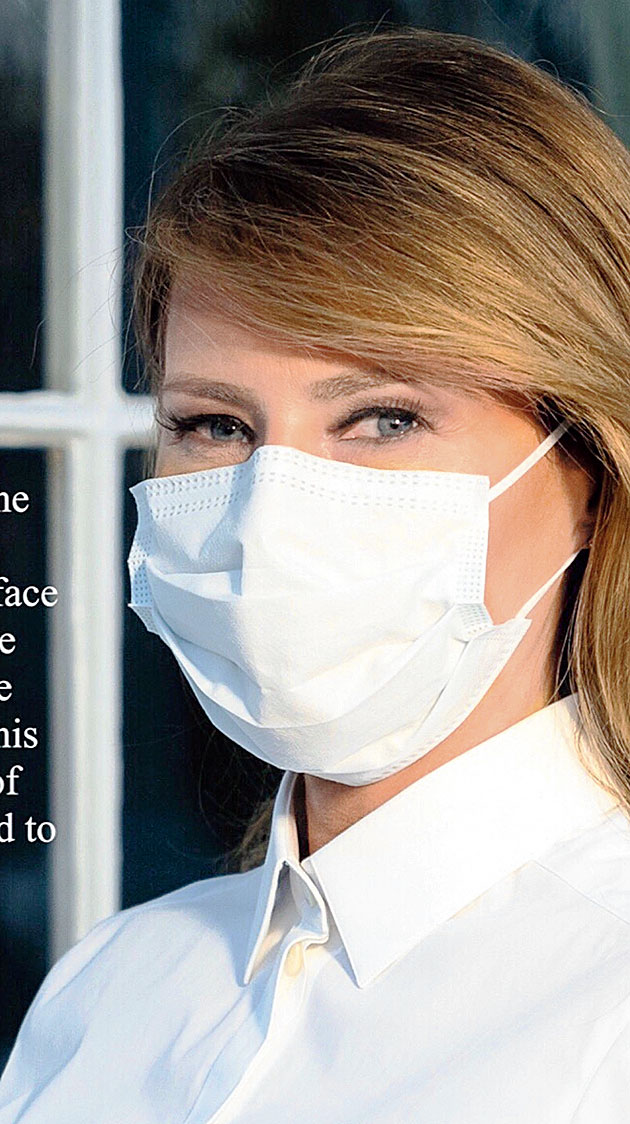In a message on Twitter accompanied by a picture of her face partly covered by a medical mask, Melania Trump, the US first lady, urged Americans on Thursday to protect themselves from the coronavirus by wearing face coverings in public, an image all the more striking because it contrasted with her husband’s mixed messages on the subject.
“As the CDC continues to study the spread of the Covid-19, they’re recommending people wear cloth face coverings in public settings where social distancing measures can be difficult to maintain,” Melania said in an accompanying video, referring to the Centers for Disease Control and Prevention. She cited grocery stores and pharmacies as examples.
“Remember,” she added, “this does not replace the importance of social distancing.”
After a slow start to acknowledge the virus, Melania has since issued a string of public service videos meant to echo public health guidelines on social distancing and hand washing.
But in his lengthy televised coronavirus news briefings, President Donald Trump offers his own interpretation of the rules: he has told reporters that he would not be interested in wearing a mask unless he deemed it important.
Instead, everyone who comes into close contact with Trump must now be tested for the virus, including journalists in the White House briefing room, according to White House officials.
“I don’t know, somehow sitting in the Oval Office behind that beautiful Resolute Desk,” the President told reporters on Friday, “I think wearing a face mask as I greet presidents, prime ministers, dictators, kings, queens, I don’t know. Somehow, I don’t see it for myself. I just — I just don’t. Maybe I’ll change my mind, but this will pass, and hopefully it’ll pass very quickly.”
It was far from the first time that the first lady’s message differed from Trump’s, but some examples have been starker than others.
In August 2017, it was Melania who stepped forward before her husband to condemn the deadly white nationalist march in Charlottesville, where one woman was killed by a white supremacist: “Our country encourages freedom of speech, but let’s communicate w/o hate in our hearts,” she tweeted after the protest turned violent. “No good comes from violence.”
Trump, on the other hand, was roundly criticised for suggesting that the blame for the violence laid with people on “both sides” of the protest.
With her child-focused programme, BeBest, Melania has tried to promote healthy online lifestyles and the prevention of online bullying. Trump, of course, uses Twitter as his primary battering ram against Democrats, critics and members of the news media.
But in December, Melania refused to admonish her husband for mocking Greta Thunberg, a 16-year-old climate activist, on Twitter. Stephanie Grisham, the White House press secretary at the time, said that the first couple “often communicate differently”.
Throughout the coronavirus outbreak, the first lady has been criticised for seeming to have a different set of priorities. She encountered widespread criticism at the beginning of it for focusing on building a tennis pavilion at the White House instead of warning Americans about the spread of the virus.
According to an administration official, Melania waited until official government guidance was released to begin filming public service announcements and issuing warnings on Twitter.
In recent days, she has been more engaged with the issue, including by fielding calls from her counterparts in France and Italy to discuss steps to defeat the virus. And after cancelling the annual White House Easter Egg Roll because of coronavirus concerns, Melania donated thousands of wooden eggs to workers at hospitals and federal agencies.










